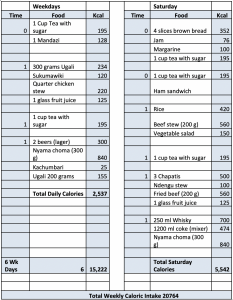Dr. Dennis Nturibi
Ach! Blogging is hard work! I’m discovering it is so easy to throw around opinions and sentiments to all manner of people around me, but it is truly challenging to think about what you’re planning to say, revise it in your head and come up with something sensible. This is what blogging is forcing me to do. But then I wonder, has this got more to do with human nature than the demands of blogging? Do we just inherently like things easy and simple, myself included? Case in point: A young man of 46 has visited the casualty department because of a headache that has been bothering him for the last 2 weeks. As part of routine examination he is noted to have high blood pressure. After a comprehensive review, and hopefully a few more visits, he is diagnosed to be hypertensive (high blood pressure disease). As part of his management, and on top of daily medication (expected to be used for life), it is suggested that he needs to pull back the throttle on his lifestyle, and gear down from the fast lane. Practically this involves less stress, less eating of rich foods, less drinking of alcohol and coffee, more play, more relaxation, more fruits and vegetables and more drinking of plain water. Sounds simple enough? Then how come, one year later, this same young man is struggling with the basics of this plan? One year later, he has actually added weight, and whereas last year he was 20 kg over his ideal weight, now he is 25 kg over his ideal weight! How can such a ridiculously simple plan be so incredibly difficult to follow?
Lets review some very simple mathematics (please note, this is not rocket science, all this information is available for free online & I have put in appropriate links). Lets call this man Dennis. He is 170 cm in height (about 5 feet, 7 inches). He now weighs 97 kg. This puts his Body Mass Index (BMI= Weight (kg)/height x height (meters)) at 33.5. This is known Class 1 Obesity. With his ideal BMI being maximum of 25, his ideal maximum weight should be 73 kg.
But how does all this happen? Let look at his typical week.
He wakes up at 5.00 am to make sure he leaves the house by 5.45 am otherwise traffic will mess his whole day. He does not have breakfast. He will be back home at about 10.00 pm on a regular basis. This is after various after work meetings that he feels he cannot avoid as a senior manager. During the day he will be at the office from 7.00 am and will leave at 5.00 or 6.00 pm to go to a nearby local bar or restaurant, and while he waits for traffic to reduce he will have a meeting or two, some formal, most informal. He spends 90 % of his day seated.
His food intake looks something like this:

For simplicity’s sake we’ll assume he eats the same food 6 days of the week and that he drinks 2 beers daily (of course some days none, while others 2 to 6 beers). We shall also ignore the occasional family party where as we all know we over-indulge, and the occasional corporate buffet where we eat every item served, and those amazing deserts (that can pack a whooping 800 Kcal per serving). Note that though he doesn’t eat fruits, he does “try” in the vegetable department.
For his weight and height, his daily requirements (Total Daily Energy Expenditure) to maintain his weight (not gain more) are 2,328 Kcal. This translates to 16,296 Kcal per week. Here we see he is eating an extra 4,468 Kcal per week. All factors remaining constant, this translates to a gain of 0.58 kg per week or 30 kg per year! By just looking at caloric excess, would this man expect to get better or worse with time? Most likely his degree of obesity will increase, he will develop insulin resistance (pre-diabetes) and ultimately diabetes. This kind of caloric excess is now definitely known to be associated with obesity, diabetes, hypertension, heart disease, stroke, arthritis, gout, sleep apnea, asthma and various cancers. Even without looking into his lack of exercise, unhealthy work habits, stress level and poor quality of life, we can see how food is killing him. He is not alone in this dilemma. Even for those who don’t smoke or take alcohol, the caloric excess can be clearly demonstrated. With our current lifestyles, caloric excess is a constant reality. Not many can be directly blamed; most of us just don’t know enough to know any better.
We have to think long and hard about what is ailing us as a people. Is it a bad attitude or just lack of understanding? What role are medical professionals playing, and more importantly not playing? I am not about to suggest we all start counting calories, there is an easier & more practical way to get healthy, as we shall see over the next few weeks.
I would argue that any man (& of course woman) who demands of themselves to like things “not simple”, to follow the more challenging path, is one who will ultimately find success and great reward. We all need to be involved in learning how today we are digging our own graves a bite at a time.




